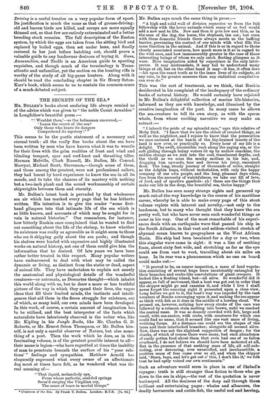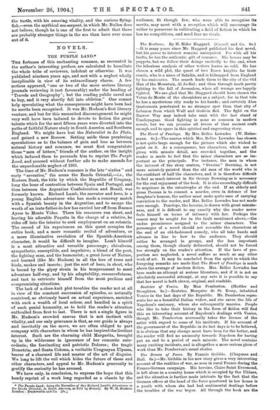"‘ Wonldst thou,'—so the helmsman answered,—
'Learn the secret of the sea? Only those who brave its dangers Comprehend its mystery I' "
This seems to be the poetic statement of a necessary and eternal truth : all the really fine books about the sea have
been written by men who have known what it was to wrestle for their lives with the grim realities of frost and wind and blinding tempest, spar and reef-knot and thrashing tiller. Herman Melville, Clark Russell, Mr. Bullen, Mr. Conrad, Marryat, Michael Scott, Stevenson,—though some of them, and those among the greatest, were not professional sailors, they had learnt by bard experience to know the sea in all its moods, and to take the chances of its mastery with nothing but a two-inch plank and the sound workmanship of certain shipwrights between them and eternity.
Mr. Bullen's latest book is pervaded by that wholesome sea air which has marked every page that he has hitherto written. His intention is to give the reader " some first- hand glimpses into that intimate life of the sea which is so little known, and accounts of which may be sought for in vain in natural histories." One remembers, for instance, how bitterly Ruskin once complained that he wanted to find out something about the life of the shrimp, to know whether its existence was really as agreeable as it might seem to those who see it skipping gaily about the sea pools ; and though his shelves were loaded with expensive and highly illustrated
works on natural history, not one of them could give him the information that he desired. Of late years we have been rather better treated in this respect. Many popular writers have endeavoured to deal with what may be called the dynamic or living, as distinct from the static or dead, aspect
of animal life. They have undertaken to explain not merely the anatomical and physiological details of the wonderful creatures—or automata, as Descartes thought—which inhabit this world along with us, but to draw a more or less truthful picture of the way in which they spend their lives, the vague ideas that fill their limited minds, the instincts and intelli- gences that aid them in the fierce struggle for existence, out of which, as many hold, our own minds have been developed. In this work, of course, a certain amount of imagination has to be utilised, and the best interpreter of the facts which
naturalists have laboriously observed is the writer who, like Mr. Kipling in his Jungle Books, like Mr. Charles G. D. Roberts, or Mr. Ernest Seton Thompson, or Mr. Bullen him- self, is not only a careful observer of Nature, but also some- thing of a poet. Then the work which he does, as in this fascinating volume, is of the greatest possible interest to all—
their name is legion—who have regretted at times the inability of man to penetrate beneath the surface of his " poor rela- tions' " feelings and sympathies. Matthew Arnold has eloquently expressed what every owner of an affectionate dog must at times have felt, as he wondered what was the real meaning of-
" That liquid, melancholy eye, From whose pathetic, soul-fed springs Seem'd surging the Virgilian cry, The sense of tears in mortal things."
• Creatures of the Sea: By Frank T. Bullen. London: B.T.S. [7s. 6d.] "A high and solid wall of division separates us from the full fellowship with the lower animals which many of us feel would. add a new zest to life. Now and then it gets low and thin, as in the case of the dog, the horse, the elephant, the cat; but even with these domestic friends there always meets us the baffling barrier, preventing the contact of our minds with what fills the same function in the animal And if this is so in regard to thoSe closely associated creatures, how much more is it so in regard to the wild ones, and how immeasurably greater in the case of those interesting beings of whom we only catch fleeting glimpses as, it- were. Here imagination aided by experience is the only inter- preter. It may mistranslate, it may fail to understand many things at all, but on the other hand it may—it has, it often does. —hit upon the exact truth as to the inner lives of its subjects, at any rate, in far greater measure than any statistical compilation can ever do."
This was the sort of treatment, as we think, that Ruskin desiderated in his complaint of the inadequacy of the ordinary books of natural history. He would certainly have rejoiced in Mr. Bullen's delightful collection of marine life-histories, informed as they are with knowledge, and illumined by the creative imagination of the poet. In many cases he allows the sea-creature to tell its own story, as with the sperm whale, from whose exciting narrative we may make an extract :- " I inherit the pride of my splendid race," says this relative of Moby Dick. "I know that we are the oldest of created things, as well as the mightiest, and I rejoice to know that the persecution we once endured at the hands of the big-brained insects of the land is now over, or practically so. Every hour of my life is a. delight. The swift, irresistible rush along the raging sea, or the soft gliding through balmy waters lit up by mellow sunshine, the sudden change as we sink into the cool, translucent depths, and the thrill as we seize the musky mollusc in his lair, and, dragging him upwards, tear and devour his juicy, succulent flesh. The long, steady journey of thousands of miles, straight as the dolphin leaps, without molestation, with only the happy company of our own people, and the long, pleasant days when,. free from the necessity of watchfulness, we take our fill of love,. of food, and of sportive gambols: al ! these are the things that make our life in the deep, the beautiful sea, thrice happy."
Mr. Bullen has seen many strange sights and garnered up much out-of-the-way knowledge in the course of his maritime career, whereby he is able to make every page of this stout volume replete with interest and novelty,—not only to the landsman, but to many who thought that they knew the sea. pretty well, but who have never seen such wonderful things an came in his way. One of the most remarkable of his experi- ences deals with an earthquake wave that passed his ship in the South Atlantic, in that vast and seldom-visited stretch of abysmal ocean known to geographers as the West African Basin. His ship had been becalmed for a day or two, when this singular wave came in sight : it was a line of seething foam, about sixty feet wide, and stretching as far as the eye could see from east to west, travelling about six miles an, hour. In its rear was a phenomenon which no one on board. could make out:- " It proved to be, on nearer inspection, a mass of land vegeta- tion consisting of several huge trees inextricably entangled by their branches and snake-like convolutions of giant creepers. It looked like a floating island, but—all alive. So wonderful did it- appear, so full of movement, that a boat was got out in order that the skipper might go and examine it, and while I live I shall never forget the amazing sight it presented upon a close view.. Long before we got to it, the boat's way was impeded by the vast, numbers of Bonito converging upon it, and making the sea appear as thick with fish as it does in the middle of a herring shoal. We pressed on, however, noticing how every stroke of the oars was followed by a crimson stain melting into brown, until we reached. the central mass. It was so densely crowded with fish, large and small, with sea-snakes, with crabs, with creatures for which one could find no name, that it seemed like one vast mass of living, writhing forms. At a distance one could see the shapes of the trees and their interlocked branches; alongside all seemed alive. Now, there was not the slightest suggestion of danger; for the sharks, of which of course there were many, had such abundance of easily gotten food about them that even had one of us fallen overboard, I do not believe we should have been molested at alL But in the presence of that seething mass of life, all self-sub- sisting, ever devouring, ever unsatisfied, and inexhaustible, a positive sense of fear came over us all, and when the skipper said, Stern, boys, and let's get out o' this, I don't like it,' we felt that he had aptly voiced our own sentiments."
Such an adventure would seem in place in one of Sinbad'e voyages : truth is still stranger than fiction to those who ge down to the sea in ships,—the rest of the quotation is never hackneyed. All the denizens of the deep sail through these brilliant and entertaining pages : whales and albacores, the deadly barracouta and cuttle-fish, the useful cod and herring,
the turtle, with his amazing vitality, and the curious flying- fish,—even the mythical sea-serpent, in which Mr. Bullen does not believe, though he is one of the first to admit that there are probably stranger things in the sea than have ever come out of it.















































 Previous page
Previous page